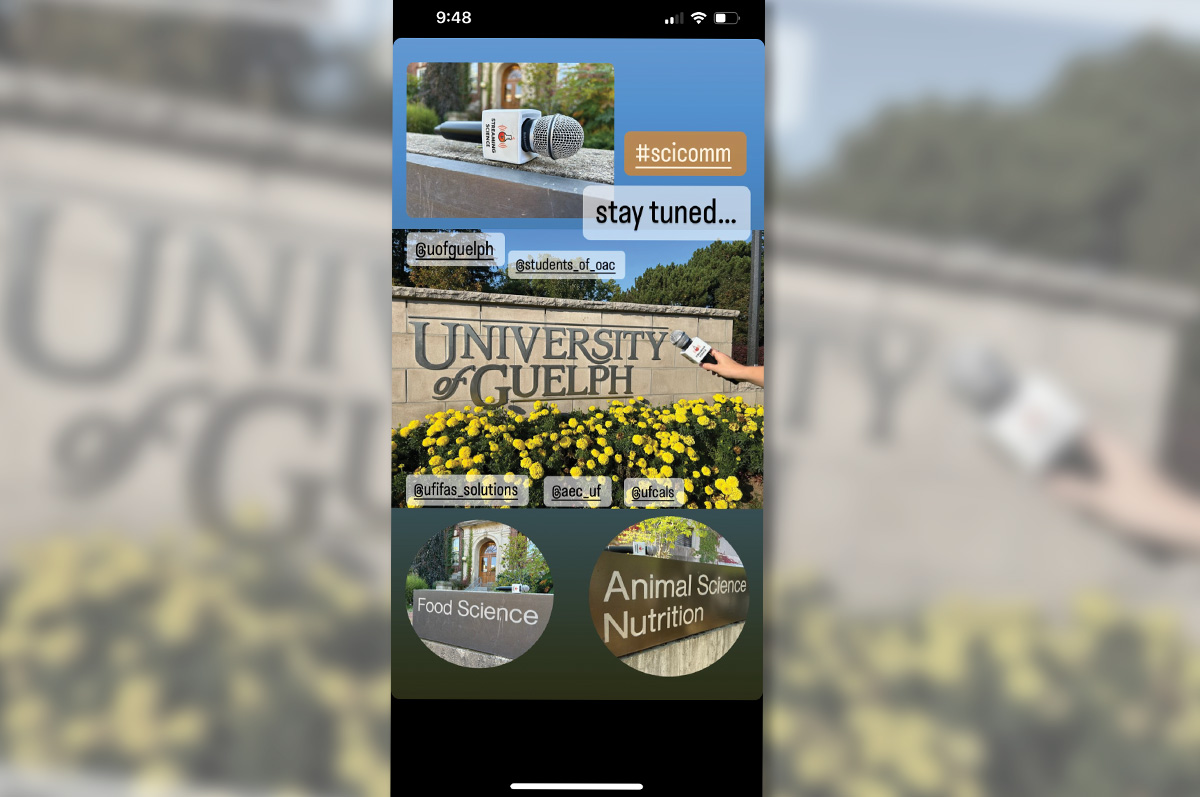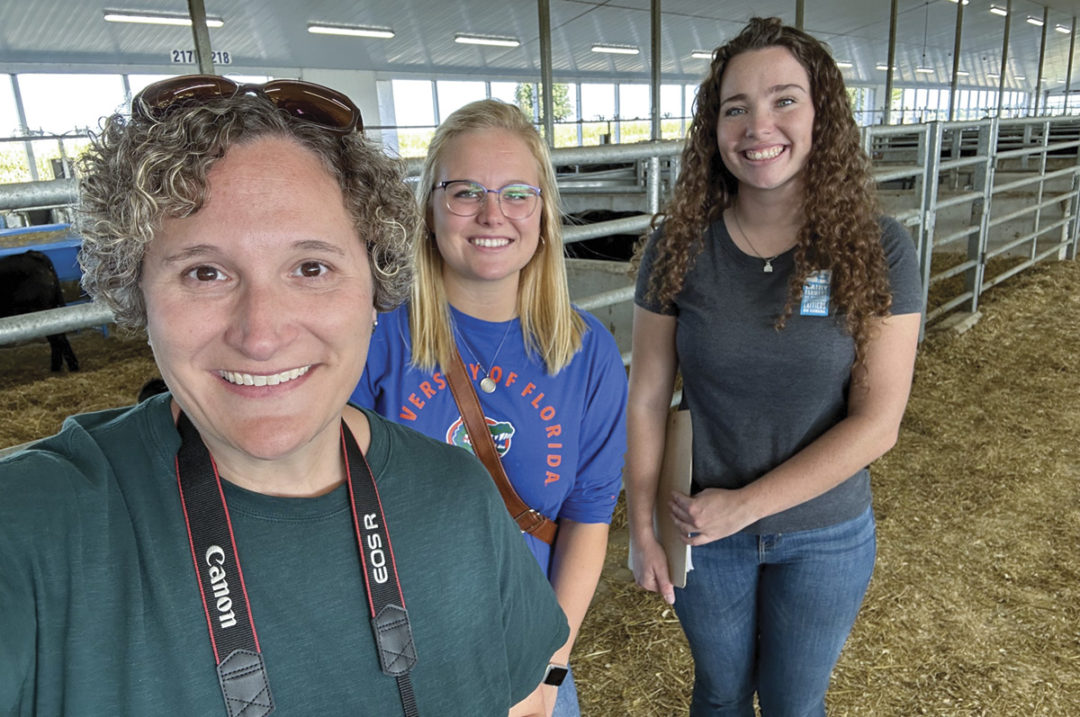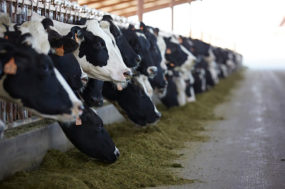The University of Florida and the University of Guelph have cultivated a new science communication collaboration to engage college students in an international podcast production. University of Florida students will interview Ontario Agricultural College (OAC) scientists about critical agricultural and natural resources (ANR) topics.
Project-based ANR communication
The dairy industry is complex, dynamic and benefits healthy lifestyles around the world in a variety of ways. ANR scientists relentlessly investigate sustainable ways to improve the nuances of dairy production to benefit producers, animals and the environment. Upcoming professional science communicators should learn how to navigate important ANR contexts such as the dairy industry through classes that include real-world projects. There is an opportunity for students to engage with scientists, stakeholders and audiences to examine and explain ANR issues in ways that bring everyone to the table – consider values and scientific information, encourage critical compassionate listening and nudge science-based decision-making.
The Streaming Science project in the University of Florida Department of Agricultural Education and Communication (UFAEC) takes a project-based learning approach to prepare the next generation of ANR communicators and is working with the University of Guelph to scale up this important teaching approach to an international level. The project is a student-driven science communication initiative, including student-developed podcasts, electronic field trips, photo essays, videos and related social science research developed by students in project-based courses.
Growing the partnership
Through this initiative that bridges international borders and academic disciplines, we traveled to the University of Guelph in October 2023 to cultivate the partnership that would sow the seeds of sustainable agriculture and natural resources communication through the power of podcasting.

Streaming Science Instagram post from OAC collaboration visit to Guelph campus.
The project joins UFAEC with the OAC through faculty and student collaborations. The partnership will result in a podcast series promoting innovative Ontarian science in sustainable food and agriculture. Our endeavor received support from the UFAEC department through seed funding for the partnership.
This partnership is an opportunity to not only work with OAC scientists and students, but to communicate about the incredibly important and groundbreaking work they do every day.
During our visit, we met with OAC acting dean, Dr. John Cranfield; interim vice president of research, Dr. Rene Van Acker; and scientists and graduate students from the Ontario Crops Research Centre, Research Institute for Food Safety, food science department and animal biosciences department. We also traveled to the Ridgetown campus and the Ontario Beef and Dairy Centres in Elora.
The Baes lab
As we sat down with OAC scientists during our visit, they noted that the depth and diversity of University of Guelph expertise is substantial. Notably, Dr. Christine Baes, professor and chair of the animal biosciences department, shared insights into her research on dairy genetics. Baes is one of the lead researchers on The Resilient Dairy Genome Project, which uses a combination of biology, genetics, technology and social science research to sustainably improve Canada’s dairy industry. Undergraduate and graduate students in Gainesville, Florida, will learn more about Canada’s dairy production, practices and OAC’s research through their interactions with Baes and her lab team of graduate students from around the world.
By zeroing in on sustainable dairy practices, the collaboration ensures that the podcast series will delve deep into a critical aspect of agriculture with far-reaching solutions-focused learning for student podcast producers and listeners.
Podcast plan
During the spring 2024 semester, UFAEC students enrolled in an undergraduate and graduate cross-listed course, informally called "Podcasting to Increase Science Literacy," will work through a series of assignments to conduct background research about the OAC and its scientists, and ANR topics in Canada.
Students will then interact with these scientists, holding a series of production meetings to plan, record and edit podcasts about their backgrounds, expertise and research.
The podcasts are ultimately meant to serve as a dialogue for listeners to learn about international ANR topics, science-based information and related careers, and solutions applicable to their everyday lives.
We started the Streaming Science project almost seven years ago as a way for budding science communication students to get real-world, hands-on experience. This will be our first-ever international podcast series. I look forward to watching our University of Florida students expand their thinking about ANR issues and sciences on a global scale and are so grateful for the University of Guelph partnership.
The student-produced podcast episodes will be shared on the Streaming Science and OAC websites and social media starting in summer 2024. This collaboration not only fortifies international partnerships for both institutions, but also opens doors for students to explore the ANR industries in Ontario. Conversely, OAC students and scientists are given the opportunity to meet with University of Florida students and gain valuable promotional materials for the work taking place at the institution. The project serves as a bridge, connecting students from both universities and fostering collaboration that will hopefully continue years down the road.
As the collaboration between the University of Florida and the University of Guelph unfolds, it stands as a testament to the power of interdisciplinary partnerships in addressing the global challenges of sustainable agriculture. Through the medium of podcasting, these academic developers aim to cultivate a new crop of informed and engaged individuals ready to tackle the complexities of our ever-evolving ANR landscape.










